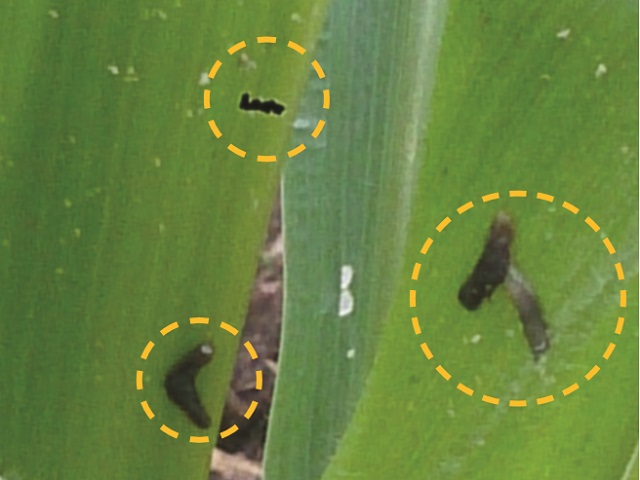
Fall armyworms are back, but government’s help isn’t
Kampala, Uganda | Andrew S. Kaggwa | The rains are back but so is the dreaded fall armyworm. This time it is attacking maize at a much younger stage – meaning it will be more costly for the farmers than last season. Unfortunately, so far, the Ministry of Agriculture appears to have left the farmers to battle their fate without government help.
Earlier reports by Operation Wealth Creation (OWC) Programme Director for Policy and Planning Sarah Kataike Ndobooli that farmers could get pesticides at subsidised prices appear to have been quashed by the Agriculture minister, Vincent Ssempijja.
In an interview with The Independent on Sept.14, Ssempijja said although farmers were already enjoying subsidised prices for drugs under the Sector Development Programme (SDP), the government’s plan is to shift from subsidizing farmers.
“We want to move away from subsidizing for farmers and they pay the whole cost,” Ssempijja said.
He said currently farmers pay 70 percent of the cost and the government pays the remaining 30 percent for them through their associations. It was, however, not clear what associations he was referring to since the old cooperative movement which brought farmers together in associations collapsed.
Kataike had offered hope.
“Government is weighing all options to ensure that farmers get the chemicals at a subsidised rate,” she reportedly said in an interview with the Daily Monitor newspaper.
At the time, Kataike confirmed that the fall armyworm is present in more than 50 of the 120 districts in the country. She also noted that pesticide control is likely to be too expensive for many farmers.
The latest climate forecast by the Uganda National Meteorological Authority (UNMA) indicates that all parts of Uganda were by mid-September receiving rainfall adequate for planting to start.
So farmers like Hajji Umaru Ddumba, a renowned maize planter in Makukuba village, Nabbaale subcounty in Mukono District, are hatching survival plans. Last season Ddumba planted 12 acres and battled the fall army worm. He says his efforts paid off as he the losses he suffered were less than he had earlier feared.
“I expected to harvest 20 bags per acre which would give me a total of 240 bags but I got only 178,” Ddumba says.
Despite the losses he has encountered, because farming is his business, Ddumba says he has again planted 10 acres of maize this season but will be more careful about the fall armyworm.
“I gave my workers instructions to move through the maize plantation every day to see any signs of a fall armyworm attack so that we tackle it early enough,” Ddumba says.
He is constantly calculating how much spraying the fall armyworm hit his pocket this time.
At last season’s prices, Ddumba’s maize harvest which was 62 bags shy because of the fall army worm means he lost about Shs3.7 million in lost output alone. Not counting the cost of pesticide and extra labour he used. The calculation is based on each bag weighing 100kgs at an average price of Shs600 per kg of maize.
Ddumba says he spent Shs2.7million on pesticides for spraying the fall armyworm. That pushes his loss of over Shs6 million on the year’s harvest.
Last year was also the second successive season that Ddumba was making losses from growing maize. In the 2016, he planted seven acres of maize and he expected to harvest 140 bags but got only 105 bags. The crop was scorched by drought.
 The Independent Uganda: You get the Truth we Pay the Price
The Independent Uganda: You get the Truth we Pay the Price



